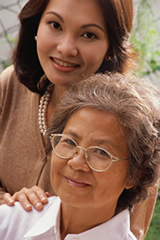|
|
Caring for Senior Citizens Requires the Help of All Family Members
Daily News Transcript
May 26, 2005

When a senior citizen needs either minor or extensive care from his or her family, it's important that all family members be alerted of the situation and become involved in the process.
The topic of family members caring for loved ones is nothing new. According to the National Alliance for Caregiving, nearly one-quarter of households in the United States are involved in caregiving to individuals age 50 and older. A typical caregiver in the United States is a 46-year-old female who spends more than 20 hours per week providing care to her parent, according to the NAC. In fact, more caregivers in the United States are women (61 percent) than men (38 percent), the NAC reported.
"The care of an aging family member shouldn't rest on the shoulders of one family member. This leads to stress, not only for the family, but the caregiver as well," said Vladimir Zarkhin, owner of the Right at Home Boston metro west office. "Keeping the family lines of communication open can make the situation less stressful on everyone involved. And the family members will be more knowledgeable of the situation when additional decisions need to be made in the future."
If families have members who live in another city or state, it's important to keep those individuals involved in the senior's care as much as possible. Zarkhin suggests the following tips:
* Alert and discuss the senior's needs with all family members;
* Divide responsibilities among the family, where possible;
* Establish regular communication via meetings, conference calls or group e-mails;
* Research additional resources to provide care when the family cannot;
* Give the primary caregiver a break as often as possible.
Zarkhin also advises when all family members live in the area, include them in meetings with the senior's primary care physician or other medical specialist. When family members have a say in the care of their loved one, they're more likely to remain active in the senior's care.
Should families seek support from care agencies, such as Right at Home, the agencies should work directly with families to fill in the gaps of care. Families should not only provide input on the type of care their loved one receives, but they also should be kept informed with family care reports.
"A quality agency will issue family care reports," Zarkhin said. "These regularly scheduled reports frequently update the family on the status and care of the senior citizen. It's an easy way for the family to remain involved in the care, and the time commitment is significantly reduced."
Right at Home is a national franchise organization, with a local office that serves the communities of the western Boston metro area. Right at Home offers in-home supportive care to seniors and other adults to help them continue living independently. Medical home healthcare is offered through some franchise offices. RAH Staffing Services, a division of Right at Home, provides temporary staffing solutions for the healthcare industry. Right at Home is based in Omaha, Neb., with franchise offices throughout the United States. For more information on Right at Home, visit the company's Web site at www.rightathome.net or the Boston metro west office Web site.
|
|



